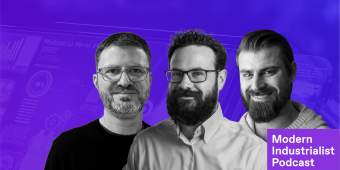Highlights from the International Manufacturing Technology Show
Modern Industrialist Podcast

Powered by RedCircle
The episode:
In Patrick Turley’s own words, his “dogs are barking,” but the ache of his feet doesn’t compare to the excitement he felt walking around the International Manufacturing Technology Show for days. Patrick joins the podcast to give us highlights from the event.
He tells about trends he saw from 3D printing and additive manufacturing vendors. Then Patrick goes over what he saw in the automation and robotics space. He wraps up by describing what he saw in terms of connected systems and digital twins.
Whether you are a suit-wearing type or a camouflage-hat-wearing type– or both – you’ll get a lot out of this episode, including a renewed excitement about the future of manufacturing.
Resources:
Learn more about the TXI and Dickson success story
Revisit this year’s IMTS exhibits at IMTS.com
Check out Formlabs Fuse 1+ 3D printer
The podcast:
Presented by TXI, The Modern Industrialist Podcast is for technology-focused manufacturing and logistics leaders looking to gain a competitive edge with Industry 4.0 transformation. Join our host Jason Hehman as he brings together experts from companies blazing the path for the IIoT revolution. Topics range from advice to success stories, use cases, solutions, and more.
The expert:
Podcast Host: Jason Hehman, Industry 4.0 Vertical Lead and Client Partner at TXI
Co-host: Matt Reich, Lead Software Engineer at TXI and Patrick Turley, Head of Engineering at TXI
Book a meeting with Jason
Summary and themes explored in this episode:
Introduction and Background:
Hosts Jason Heumann, Matt Rich, and Patrick Turley introduce the episode, focusing on their visit to the International Manufacturing Technology Show (IMTS).
The IMTS is described as one of the largest manufacturing trade shows in the world, showcasing the latest in 3D printing, automation, robotics, and digital twins.
The conversation aims to explore trends and innovations in these areas with insights from Turley’s recent trip to IMTS.
IMTS Experience Overview:
Turley shares his first-time experience attending IMTS at Chicago’s McCormick Place, describing it as a massive event with tens of thousands of attendees.
He reflects on the scale of the event, which spanned six days and multiple buildings, each dedicated to specific industrial themes, making it an overwhelming but enriching experience.
3D Printing and Additive Manufacturing:
Turley dives into his main interest—3D printing—specifically the additive manufacturing section of IMTS, focusing on industrial applications rather than consumer-grade devices.
He discusses interactions with Formlabs, known for its SLA resin printers, and highlights the importance of new materials, such as resin with properties similar to porcelain, which provide better strength and weight for industrial parts.
The conversation covers safety advancements in resin printing and the potential for scalable production lines with reduced costs.
Key Insights on Scaling Additive Manufacturing:
Turley shares that Formlabs and other companies are focused on making 3D printing materials and processes cheaper to facilitate mass adoption in traditional manufacturing lines.
The team discusses challenges in scaling additive manufacturing, emphasizing the need for cheaper materials and more cost-effective equipment to allow broader integration into traditional production processes.
SLS (Selective Laser Sintering) Printing Technology:
Turley describes his experience with Formlabs’ Fuse One Plus SLS printer, which uses powder and lasers to create industrial-grade parts.
SLS technology’s benefits include no need for supports during printing, the ability to print vertically, and reduced waste, making it more efficient for creating complex structures.
The potential for using SLS to mass-produce parts like fidget cubes demonstrates the printer’s versatility and cost-saving advantages by reclaiming unused powder.
Challenges in Metal 3D Printing:
The episode addresses ongoing challenges in metal 3D printing, particularly the high cost of materials and the complexity of producing high-volume parts with strong industrial properties.
A major focus is shifting 3D printing from being perceived as a premium, bespoke manufacturing option (the "Rolls Royce" approach) to one that can support mass production at scale, akin to “Honda-level” production.
IoT and Digital Twin Innovations:
The team explores the integration of digital twins—virtual replicas of physical systems—into industrial manufacturing.
Siemens' focus on digital twin technology is highlighted, where complex assembly processes are simulated digitally to streamline production without the need for physical prototypes.
Robotics and Automation:
Turley recounts seeing hundreds of robotic arms at IMTS, ranging from delicate champagne-holding robots to those capable of lifting cars.
The episode touches on the varying scales of automation solutions and how some companies are focusing on providing connectivity points, although many haven’t fully integrated data-exposure APIs yet.
Diversity of Attendees and Networking:
Turley describes the diverse mix of attendees at IMTS, from students to industry professionals, all united by a shared enthusiasm for industrial innovation.
He reflects on the welcoming atmosphere and opportunities for networking, where participants freely shared knowledge and discussed emerging technologies across multiple sectors.
Final Thoughts and Lessons Learned:
Turley advises future attendees to spend the first day absorbing the vastness of IMTS and then strategically plan to dive deeper into areas of interest.
The episode concludes with excitement for future interviews, where many of the themes and insights from IMTS will continue to be explored in upcoming podcasts.
Produced by NOVA Media
Published by Jason Hehman , Patrick Turley in podcasts

Find out how intelligent solutions can accelerate growth for your organization.

